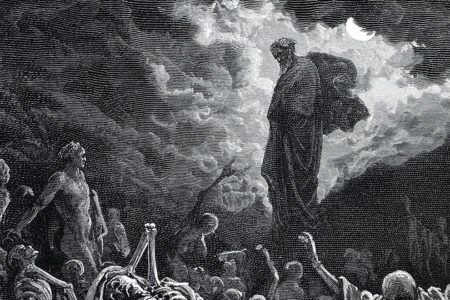Victorious Christian Living Galatians 5:13–26
“How Should We Then Live?” asked Dr. Francis A. Shaeffer in his best-selling book by that title. His question centered on how Christians should live in the midst of a declining Western culture in which lust, license, and liberation from authority were gaining worldwide acceptance.
The Galatian believers faced the same issue in their day. How were they to live out their new liberty in Christ? Should they embrace the legalistic principles taught by the Judaizers? Should they follow others who were manifesting libertine tendencies?
Paul anticipated the question. In his final polemic denouncing legalism and defending the doctrine of Christian liberty, the apostle focused his attention on this very important issue. In Galatians 5:13 to 26, Paul defined true Christian liberty and instructed believers how to lead victorious Christian lives.
Christian Freedom Controlled
Paul reminded the Galatian believers that they had been “called unto liberty” but quickly charged them not to use their “liberty for an occasion to the flesh” (v. 13). The apostle was not referring to the physical body but to the sin nature with its lustful appetites that long for self-gratification. He exhorted Christians to guard against giving their old sin nature an “occasion” (starting point of operation) to manifest evil.
Christian commitment carries with it an ethical command to love and serve others (v. 13). Believers are to voluntarily show a self-sacrificing, agape-type love and serve others with the attitude of bond slaves. Building on this thought, Paul went on to remind the Galatians that the “law [the whole Mosaic system] is fulfilled in one word … Thou shalt love thy neighbor as thyself” (v. 14). Believers who love at all times will not violate the rights of others, will voluntarily look out for their neighbors’ welfare, and will seek to minister to their brothers and sisters in Christ (cf. Mt. 22:36–40). Believers must be filled with love that is produced by the Holy Spirit in order to have the power and desire to manifest this kind of service.
If liberty in Christ is not controlled by love, conflict is sure to arise. Apparently this took place within the Galatian church. They were beginning to “bite and devour one another” (v. 15). Those who practice legalism within the church often cause strife and schism rather than spiritual unity. On the other hand, those who express their Christian liberty often fail to manifest it in love and wisdom, thereby disrupting church unity. Thus, liberty or the lack of it must be under the control of the Holy Spirit if unity is to be maintained.
Christian Fleshly Conflicts
A spiritual war is raging within Christians between their sin nature and their spiritual nature. How can we gain victory over the sin nature? Judaizers would argue that Christians need the restraining influence of the law in order to hold their sin nature in check. Paul argued just the opposite. He said that the key is to “Walk in the Spirit, and ye shall not fulfill the lust of the flesh” (v. 16). The solution to overcoming the old nature is not through Law keeping or self-effort but by the indwelling power of the Holy Spirit, who enables believers to live holy lives (Rom. 7:7–8:4). Herein lies the secret to spiritual victory in our lives. Christians who yield to the Holy Spirit’s control movement by moment will not succumb to temptation and gratify the sins of their flesh.
Paul further described the battle between the two natures when he wrote, “For the flesh lusteth against the Spirit, and the Spirit against the flesh; and these are contrary the one to the other, so that ye cannot do the things that ye would” (v. 17). Each nature has strong desires, the Adamic nature pulling toward committing sin and the new nature toward holy living (cp. Rom. 7:7–25). Thus, believers “cannot do the things that [they] would” (v. 17). The sin nature blocks believers from doing good while the Holy Spirit blocks them from doing evil in this ongoing warfare.
Believers are not passive in the battle. They are free to choose which nature they will serve. “But,” said Paul, “if ye be led by the Spirit, ye are not under the law” (v. 18). That is, those who are led by the Holy Spirit are provided the freedom and power in their new nature to live above legalism or license.
The apostle then listed “the works of the flesh” (v. 19), dividing them into four categories.
Sexual Sins (v. 19)
- “Adultery” and “fornication” (KJV) or porneia (original Greek)—immorality in general and equivalent to the English word pornography, referring to illicit sex; such sexual acts as adultery, fornication, incest, homosexuality, prostitution, and bestiality are in this category.
- “Uncleanness” (akatharsia)—impurity in thoughts and actions.
- “Lasciviousness” (aselegia)—a debauched lifestyle that indulges in brazen expression of base sexual desires without restraint, shame, or concern for others; the current free expression of sex and pornography and the spread of sexually transmitted diseases are good examples of lasciviousness.
Spiritual Sins (v. 20)
- “Idolatry”—worship of man-made idols.
- “Sorcery,” from which the word pharmacy comes—speaks of the use of drugs in witchcraft and black magic, practices that are very prevalent today.
Social Sins (vv. 20–21)
- “Hatred”—a feeling of enmity and hostility, especially within groups.
- “Strife”—contention, quarreling, and fighting, which are the natural results of hatred and are often expressed within Christian groups.
- “Jealousy”—a sin that is against others.
- “Wrath”—unrestrained outbursts of violent anger, the result of seething anger.
- “Factions”—strife resulting from a self-seeking, self-serving, selfish attitude.
- “Seditions”—discord and dissension-causing divisions among people.
- “Heresies”—factions formed by those who chose to depart from the fundamental doctrines of the Christian faith, subverting it and causing schisms in the church, such as the Judaizers.
- “Envyings”—the evil desire to take and possess what belongs to another.
- “Murders”—the premeditated taking of human life.
Surfeiting Sins (v. 21)
“Drunkenness” and “revelings”—occur when a rowdy, boisterous, intoxicated person carouses at night and becomes involved in orgies that are connected to pagan worship; Paul added the words “and the like” to indicate that he had not presented an exhaustive list of “the works of the flesh.”
The apostle included the sober warning that those “who do such things [i.e., habitually practice these sins] shall not inherit the kingdom of God” (v. 21). He was not saying that Christians can lose their salvation by committing any of the sins mentioned but that the habitual practice of such sins would indicate that the people committing them are not saved.
How, then, are believers to deal with their sin nature so that they will not commit the sins of the flesh? Paul gave the answer: “they that are Christ’s have crucified the flesh with the affections [disposition to sin] and lusts [desires]” (v. 24). Paul was not referring to mutilation of the body or self-crucifixion in order to overcome the desires of the flesh. Nor did he indicate that the sin nature has been eradicated or rendered inactive in Christians. He had already shown that those who come to Christ have been crucified with Him (2:20). When sinners are converted, their identification with Christ’s death on the cross results in the power of the old sin nature to be broken in their lives. Thus, believers have potential victory over sin by the indwelling Holy Spirit, which provides them with the needed power to shun the affections and lusts of their flesh when tempted to do evil.
Christian Fruitful Conduct
The Spirit not only provides believers with the power to live victoriously over the old sin nature but will produce fruit in the lives of yielded believers (Jn. 15:1–5). Fruit is always the outward manifestation of the inner life. Notice that the word fruit is singular. It is “the fruit of the Spirit” (v. 5, 10, 22) not “fruits of the Spirit,” as some state.
The apostle listed nine Christian virtues produced by the Holy Spirit through the new nature of believers controlled by Him. They are divided into three categories.
Psychological Virtues (v. 22)
- “Love”—agape love, a self-sacrificing love that is the foundation of all Christian virtues produced by Spirit controlled believers.
- Joy—a deep-seated, inner happiness or well-being not dependent on outward circumstances, either favorable or unfavorable, in our lives (cp. Jn. 15:11).
- “Peace”—that inner tranquillity of soul and spirit in the midst of adversity that is given by the Lord (Jn. 14:27) and transcends human understanding (Phil. 4:7).
Expressions of Christian Virtues in Public (v. 22)
- “Longsuffering”—willingness to patiently endure wrong and ill-treatment without retaliation.
- “Gentleness”—treatment of others with the same concern and kindness that God manifests to believers.
- “Goodness”—manifestation of moral uprightness and good will to those who are undeserving.
Manifestations of Personal Christian Virtues(v. 22–23)
- “Faith”—not the expression of personal faith but faithfulness and trustworthiness in ordering our walk before the Lord.
- “Meekness”—not weakness but a humble attitude of spirit toward God and gentle consideration of others in the midst of correcting their attitudes or actions.
- “Self-control”—personal rule or mastery over the spirit, desires, or fleshly impulses that would be impossible without the Holy Spirit’s control.
Paul brought his argument to a close by stating, “against such there is no law” (v. 23). God does not make laws against these things, nor would mankind make laws prohibiting the practice of such virtues. These are the very virtues that God desires believers to manifest in their Christian walk, and those who are living out these concepts need no laws to keep them in check or produce righteous attitudes and actions.
Believers, having been united with Christ through His crucifixion and resurrection, are to walk according to the enabling power of the Holy Spirit: “If [because] we live in the Spirit, let us also walk in the Spirit” (v. 25). The word walk in verse 16 means to walk about or order our manner of life in a way that glorifies God. In verse 25, the word for walk is a military term that means to go step by step in a straight line, always guiding to the right when marching in rank and file with the one leading. What a beautiful picture of Christians ordering their conduct under the guidance and power of the Holy Spirit.
The apostle concluded this section of his epistle with a warning to two groups of Galatian believers: “Let us not be desirous of vainglory, provoking one another, envying one another” (v. 26). The first group has not to use its liberty for license, seeking “vainglory,” an attitude of conceit or pride that lifts self above other Christians in their freedom. Such people tend to flaunt their liberty before weaker believers who are more legalistic and bound by conscience not to express their faith with the same liberty. The second group was composed of weaker believers who were to guard against envying and judging the former group (cp. 1 Cor. 6:7–13).
Such self-seeking attitudes from either group would be a manifestation of the flesh and would produce provocation and envy within the church. It is a stench in the nostrils of God. Believers are to walk free from the sins of pride and envy.
How should Christians then live? In a balanced Christian walk totally controlled by the Holy Spirit. Doing so requires two simple steps. First, realize and rely on the fact that you have been crucified with Christ at the moment of salvation. Therefore, the power of sin no longer has control over your life. Second, yield moment by moment to the indwelling Holy Spirit’s filling and control. The results will be life-changing, to say the least.
Although the temptation to commit sin will naturally arise, you will possess the needed power to live victoriously over such lusts of the flesh. Although others may walk in conflict with fellow Christians, your heart will be full of love, and you will serve your neighbor, whom you will love as yourself. Although others may be filled with pride, seeking vainglory and provoking fellow believers to envy, humility will be your portion. Finally, if you practice these principles, you cannot help but manifest the fruit of the Spirit.
Herein lies the secret to victorious Christian living.








